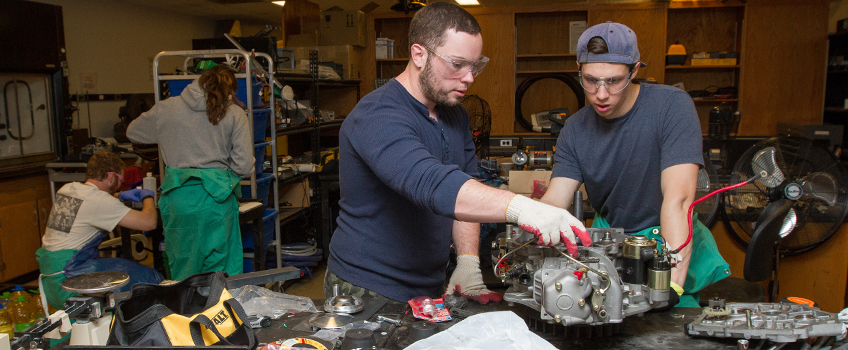Stockton University Receives National Award for Excellence and Innovation in Sustainability

Sustainability
For Immediate Release
Contact: Maryjane Briant
News and Media Relations Director
Galloway Township, N.J. 08205
Maryjane.Briant@stockton.edu
(609) 652-4593
www.stockton.edu/media
Galloway, N.J. - Stockton University, whose Galloway campus is located in the Pinelands National Reserve, will receive the American Association of State Colleges and Universities (AASCU) Excellence and Innovation Award for Sustainability and Sustainable Development, the AASCU announced today.
“Stockton University has embraced sustainability in its development and operational practices through the Stockton Sustainability Initiatives,” said the AASCU, a higher education association of more than 400 public colleges, universities and systems.
Sustainability refers to systems or processes with the power to endure and thrive despite pressures involving ecology, economics, politics or culture. Sustainability is one of the four pillars of the Stockton education, along with Learning, Engagement and Global Perspectives.
“Stockton has set aside large areas of campus as natural laboratories and to preserve a number of ecologically sensitive pinelands habitats,” the AASCU noted. “Stockton has embraced LEED building specifications where possible and has long been a leader in introducing and studying alternative energy practices, including geothermal and solar.”
The university’s Campus Center earned LEED® Gold certification in 2012 for its efficient energy use, lighting, water and material use, as well as incorporating a variety of other sustainable strategies into its design and operation. LEED, which stands for Leadership in Energy and Environmental Design, is the nation’s preeminent program for the design, construction and operation of high performance green buildings.
“Stockton University is a recognized leader in both environmental education and sustainable practices, as shown by dozens of projects carried out over the last several decades,” said President Harvey Kesselman. “When first constructed our geothermal system, with more than 400 geothermal wells that use groundwater to assist in the heating and cooling of university buildings, was the nation’s largest. Our innovative Aquifer Thermal Energy Storage system, added in 2008, assists in the heating and cooling of several Stockton facilities, and was a national first for a U.S. college or university. Stockton also was the first public entity in New Jersey to receive approval for its Forest Management plan in 2015.”
The AASCU noted that Stockton has developed an academic sustainability program and offers a B.A. and B.S. in Sustainability Science. A certificate in energy is also offered through the Physics and Sustainability programs.
“Stockton offers the only stand-alone Sustainability bachelor’s degrees in New Jersey and is only one of 50 in the nation,” said Dean Peter Straub of the School of Natural Sciences and Mathematics (NAMS). “Sustainability students regularly interact with local municipalities, school districts and homeowners to develop sustainable energy audits and promote sustainable practices. A new 37,720-square-foot academic building will include a Sustainability laboratory to house this burgeoning program. We are also adding the Unified Science Center2, a 58,210-square-foot expansion to the existing 64,000-square-foot Unified Science Center, to prepare more students for successful careers in science, technology, engineering and mathematics (STEM).”
Stockton utilizes many sustainability strategies in its operations, from solar panels to light sensors that turn off when someone leaves a room, to recycling, natural gas trash trucks and employee scheduling. Today, 95 percent of campus employees work longer hours on a four-day week for 20 percent of the year, resulting in significantly lower energy use and a decrease in greenhouse emissions generated by commuting.
The AASCU awards program, now in its third year, honors member institutions for excellence and innovation in several major areas of campus life and leadership. Leadership in regional and economic development; student success and college completion; sustainability and sustainable development; teacher education; international education; and leadership development and diversity will be honored.
“Innovation at America’s state colleges and universities is focused on advancing the quality of the educational experience for their students and the distinction of their institutions in service to their communities,” said AASCU President Muriel A. Howard. “The programs for which these universities are being honored will inspire not only their AASCU colleagues, but all of higher education.”
Criteria for the winning entries in the awards competition required evidence of top-level administrative support, connection with an institution’s mission and strategic agenda, evidence the initiative contributed to significant institutional improvements or programming, and evidence the initiative was grounded in research and incorporated best practices.
The Sustainability and Sustainable Development Award was added to the Excellence & Innovation Awards this year. AASCU’s Committee on Sustainability partnered with Solution Generation, a national council of diverse higher education partners committed to leading by example on climate solutions, to offer this award. California State University, Northridge, also received the Sustainability award.
Stockton, New Jersey’s Distinctive University, received the award on Oct. 30 at the 2016 AASCU annual meeting in Miami.


